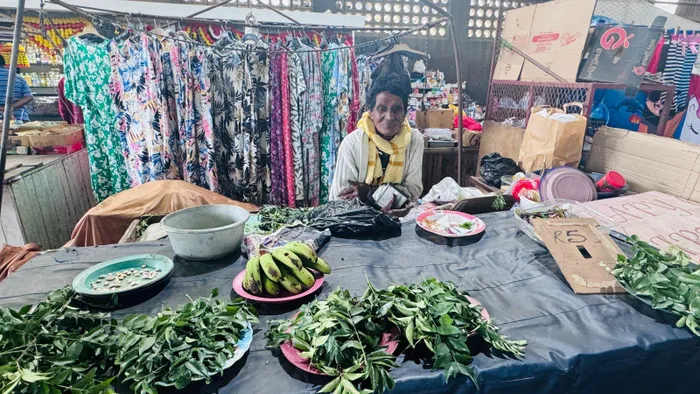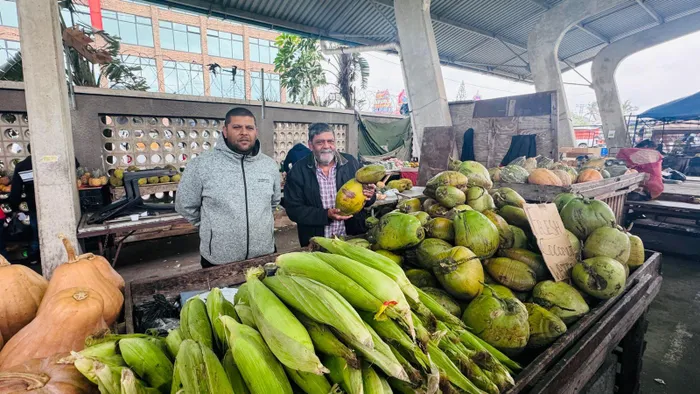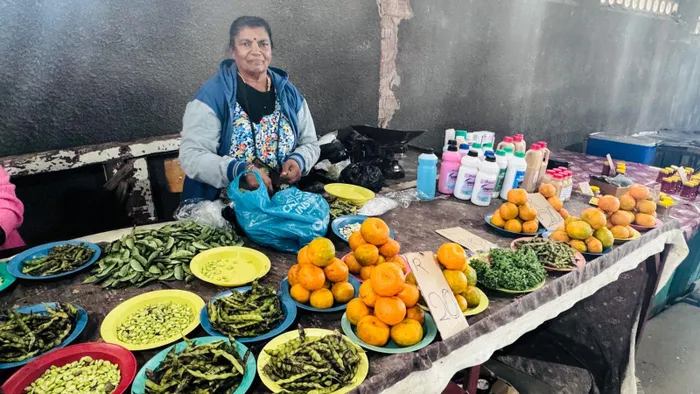Challenges and triumphs of Durban's Bangladesh Market vendors
Missing the good old days

Dawn Philemon.
Image: Monishka Govender
In cities across the world, market vendors form the vibrant heartbeat of the informal economy. In Durban, these vendors are more than just sellers of fresh produce and goods. They are the roots of a community that face economic uncertainty every day. From the bustling crowds at the Verulam Market to the Victory and Bangladesh markets, hundreds of informal vendors make their living by selling fresh produce, cooked food, handmade crafts, clothing, and traditional medicines. Despite playing a vital role in the local economy and food supply chain, market vendors often work under precarious conditions, facing challenges such as a lack of infrastructure, limited legal protection, and ongoing harassment. The POST spoke to vendors from the three markets, to reveal not only the struggles of informal work but the resilience, innovation, and dignity that define life in the margins of the formal economy.
The Bangladesh Market, located in Westcliff in Chatsworth, is a nostalgic reminder of the city’s famous Indian market of the past. The original market was established in the 1980s with the aim of providing locals with affordable fresh produce.
Today, the market offers a colourful array of wares, including fresh fruit and vegetables, fish, chicken, spices, toiletries, plants, kitchenware, and clothing. Market vendors pay R1 280 a stall per a year.
Dawn Philemon, 87, from Woodhurst, supported seven children over 35 years of being a market vendor. She started out at Durban Market in the CBD.
“I grew vegetables in my garden to support my large family. Things were different back then. My husband and six of my children have since died. My son has his own problems. The conditions here, for an 87-year-old woman, are tough and business is no longer what it used to be. I struggle to sell the little stock I have. Whatever I cannot sell, I have to pray to sell it the next day.
“There were a lot of things I wanted to do with my life but I was not lucky. When I finished school, I got a scholarship to study law. I started my studies but the donor cancelled the scholarship. I later gained entry to study nursing. During my studies, my home burnt down. My husband and I lost everything and I could not afford to continue studying.”
After many failed career attempts, Philemon ended up becoming a market vendor.
“This job was the only way to help my family financially. My husband worked at a hotel before he passed away.”
She described herself as an "everyday South African trying to make a living".
“I am battling. My house is shameful. I do not have a good home. It's falling apart. The only thing that keeps me going is my vegetable stall here."
Over the three decades that she has worked at the market, she said she met many people - some good, others bad.
"I went with the flow to sell my vegetables. My children experienced the ins and outs of this market while growing up. Despite life being a challenge, I will continue to do this until I cannot anymore. It is all I have left,” said Philemon.

Dan and Don Dhurgapersad.
Image: Monishka Govender
Dan Dhurgapersad, 78, of Welbedacht, started his market vendor journey in 1995.
His father was a scrap dealer, while Dhurgapersad had many different jobs over the years, including working in a textile factory.
He opened his stall at the market after getting married at age 26.
Dhurgapersad has spent more than 50 years selling tomatoes, coconut, jackfruit and fruit.
"My sons were young when they started helping me. Unfortunately, in 1999, my son, Hemraj, who was vital to the business, died in a car crash on his way to Cape Town to meet buyers. After this, I stopped selling large quantities of tomatoes. In those days, I was the biggest tomato merchant, selling about 35 tons of tomatoes at a time. Now my other son, Don, helps me in the stall along with my grandson and employees. We cut down on what we sell and mainly focus on fruit."
He said he missed the "old days" when the market was bustling with excitement.
“The present day is not good. We are struggling to keep afloat among the many supermarkets that surround us. They are killing my business because people rather buy from them than us small vendors. We end up throwing away stock we cannot sell. It is very sad.”
His spirits were kept up, though, by the people he met.
“I love talking to customers, which is why I have been doing this business for so long. There are some really friendly people. But some of them are different. They are not as friendly."
He said the younger generation do not know about the market and how fresh the fruit and vegetables are.
"They settle for convenience rather than support their local people. We would love for more people to visit us, not only for financial reasons but also because we love meeting people."

Andi Gounden.
Image: Monishka Govender
Andi Gounden, 72, from Umkomaas, became a market vendor in 1987. She initially sold vegetables on the roadside before the market was opened for traders.
"I was a young girl when I began working at my granny's farm. I then ended up selling vegetables near the Unit 6 Stadium until I got a place here. The stall has been a blessing as it has allowed me to support four children. But despite working hard day and night, these days I struggle to make ends meet.
“The rent for this small stall is R1 280 a year. I do not always make money. There are times when I return home without having sold a thing for the day, or the profits are small."
She sells seasonal vegetables like green beans and double beans.
“My husband loves to clean the vegetables but he does not like to talk to people, so he does not help me. I work alone at the market. Many days may be tough but I don't think I will give up my stall. It still offers a livelihood."